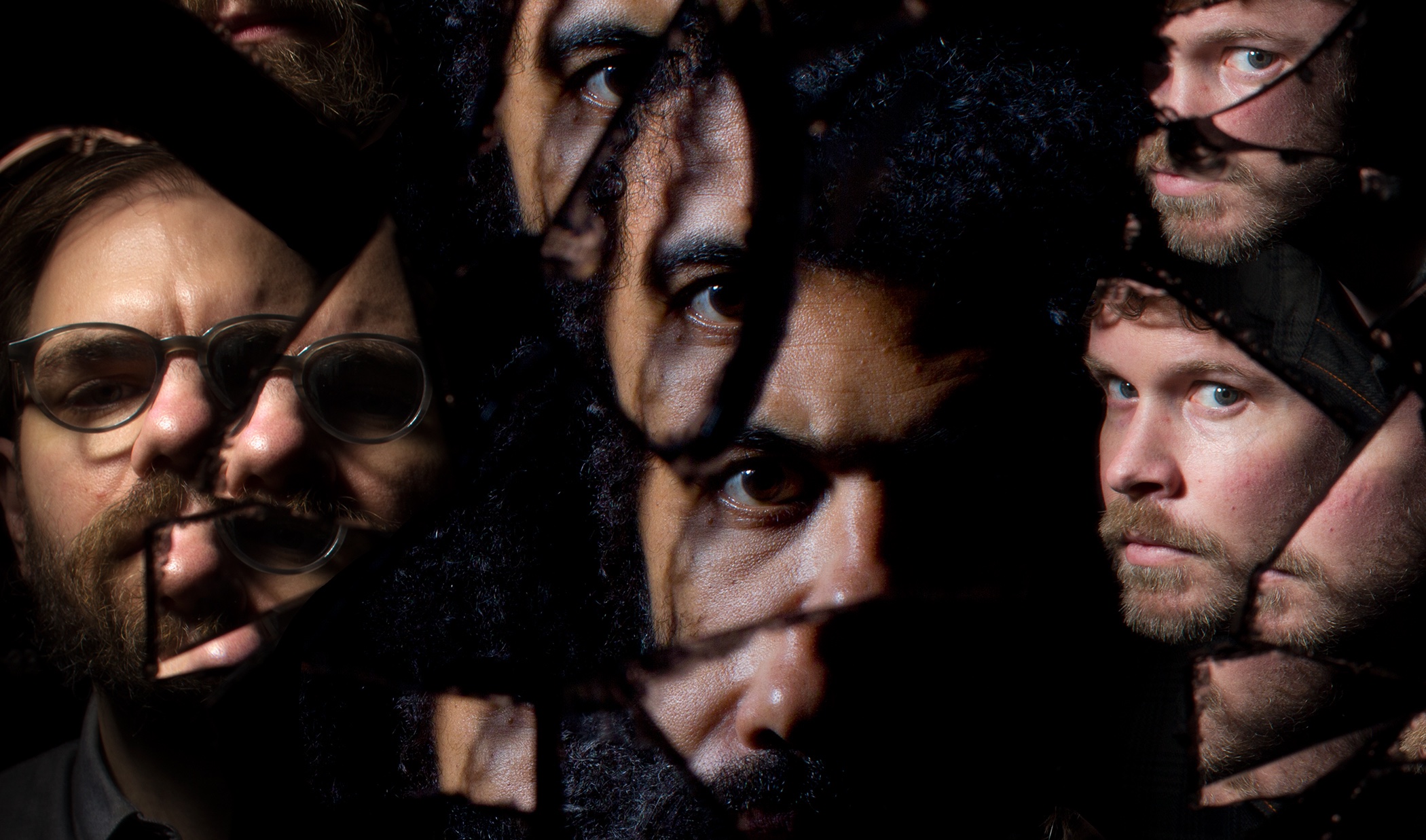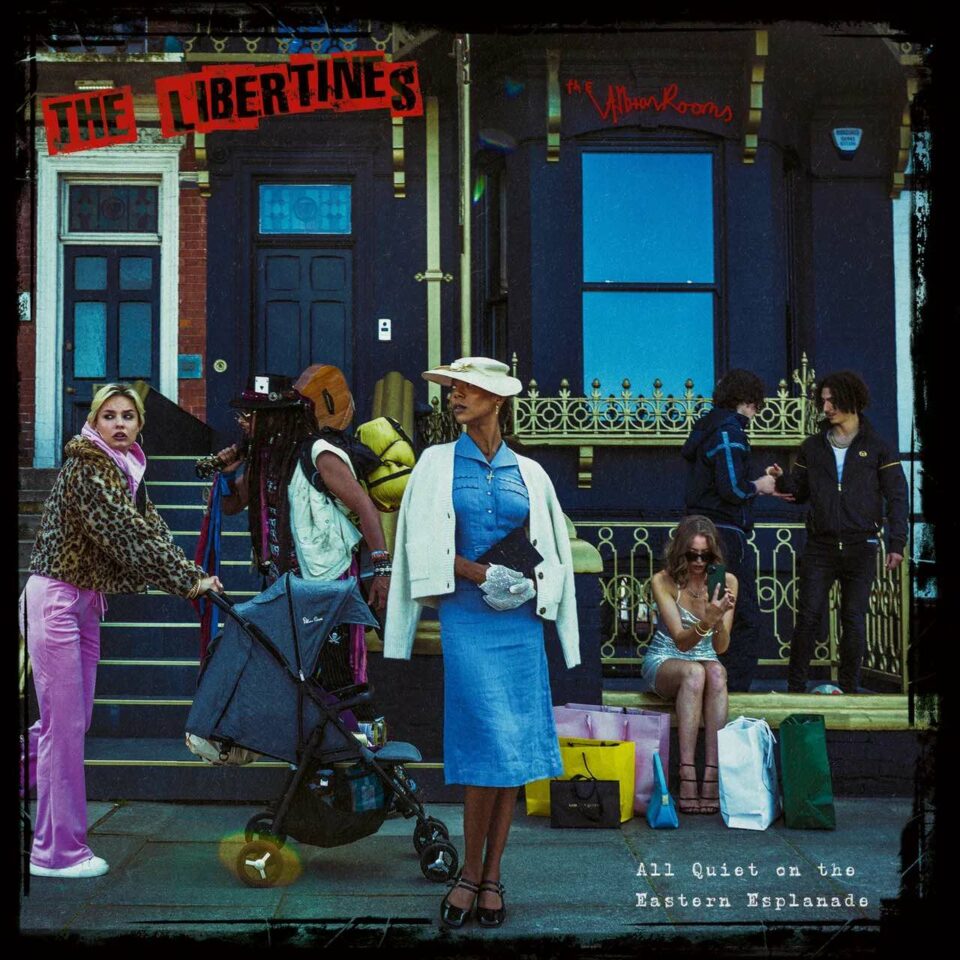Clipping.’s new album Visions of Bodies Being Burned may be conjoined at the hip of its experimental hip-hop predecessor, 2019’s There Existed an Addiction to Blood, in that the two albums were mostly recorded at the same time. Yet whether it’s the current climate of heightened awareness of police violence against Black Americans or the manner in which rapper Daveed Diggs’ voice is more boldly pronounced in clipping.’s avant-industrial mix, the trio’s usual horrors are louder and prouder in 2020 than ever before.
With that, the fear and loathing that roams through Visions of Bodies Being Burned is far more explicit than on past clipping. albums—and with that, more vividly true to life. The lynching victim come back to haunt its killers on “Pain Everyday;” the play on Clive Barker’s Candyman’s fear-fest of “Say the Name” and its ties to the BLM movement; the underlying social ills and psychological failings of “Something Underneath;” all of these things on clipping.’s newest, starkest album point to true horror’s worst fiend—reality—far beyond any fiction.
Diggs, Jonathan Snipes, and William Hutson have been making provocative horrorcore noise-rap, filled with metaphorical monsters and allegorical fears, since their initial offerings with Deathbomb Arc (2013’s Midcity) and Sub Pop (2014’s CLPPNG). As for getting Visions out now, farther apart from its predecessor than they would have liked (“A lot of things got in the way,” says Snipes of pandemics and touring breaks), you can blame the spookiest of seasons for its October surprise. “We just figured ‘put it out for Halloween.’”
This is a band used to interruptions. Take Hamilton, the Broadway musical that co-starred Diggs and won him a Tony Award. “Hamilton was an interruption in that it took longer than we expected it to take,” Diggs shares. “What Hamilton did do was introduce many people to the music we were making. And what was gratifying about that is we didn’t have to cater to them at all. It wasn’t as if all those Hamilton fans went down a Daveed Diggs rabbit hole. They liked what they heard.” Diggs begins to laugh. “I didn’t have to start telling historical narratives within clipping.” Laughing along with Diggs, Hutson notes, “Perhaps we could do a concept album about De Tocqueville.” For all of the stark, horrific images, clipping. can conjure, they like to laugh together.
“The description back then was songs for the club you wish you had never gone to. We started off making live shows that were hard to watch and not really very fun to be at.” —Daveed Diggs
The clipping. trio started its fear-filled musical journey as just Hutson and Snipes mixing their own music behind a capella samples snagged from old twelve-inch records. “We made new beats in our own style using field recordings and noise, just messing around before Daveed joined,” says Hutson. A friend to both musicians for decades, Diggs was moving from Oakland to Los Angeles where clipping. is based, loved what his two friends were doing, and offered to write fresh, real-time raps so that the twosome could ditch the ancient a capellas. “We never thought this was a real band until that first album came out,” says Snipes. “We thought that clipping. was just some side project we would do occasionally.” Diggs adds, “I think we were just busy at first figuring out what this was.”
The very real, very human voice of Diggs—deep, rapier fast, smartly ferocious—then and now, has focused on one very difficult aspect of rap lyricizing: how to remove the self, the often braggadocious first-person, from hip-hop. “The description back then was songs for the club you wish you had never gone to,” says Diggs with a laugh before going on to describe their initial in-concert settings. “We started off making live shows that were hard to watch and not really very fun to be at.”
Snipes follows that up by stating that clipping. was originally as focused on what it wouldn’t be about as what it would be—and one of those must-bes was abrasive. “We needed those rules, the strict constraints of a list to figure out what we should sound like,” says Hutson. “Once we checked off those boxes, accomplished what we set out to accomplish, we were able to feel enough so that we didn’t need the list.”
“As we loosened up those rules, we allowed more of ourselves, our true selves, to come through, to be a part of the music,” says Snipes. “People who don’t like us still don’t like that our songs are not true stories about Daveed’s life, or the distanced, novelistic, fiction-focused aspects of the band.”
How does a band maintain something personal while never touching on the first person, and how complicated a process is it to create allegories—monstrous or not—to the current political landscape without making the devils of the right or the left ever-so obvious? “Our politics are explicit without having to tell true stories—that’s what great horror stories do: decide what is monstrous and what requires saving,” says Diggs.
“Our politics are explicit without having to tell true stories—that’s what great horror stories do: decide what is monstrous and what requires saving.” —Daveed Diggs
One song that isn’t on the new album but portrays modern monsters in the harshest of bright lights, “Chapter 319,” released as a single earlier this year, studies the plague of systemic racism, references George Floyd and Breonna Taylor by name, and explicitly cuts down the president (“Donald Trump is a white supremacist / Full stop / If you vote for him again you’re a white supremacist / Full stop”) without hesitation. Ask them how the call to arms protest song—or “Knees on the Ground” from 2014—fits into the clipping. canon and Hutson says that they do not exist within their canon or trajectory. “That song exists as an essay. Recorded a day before it hit the internet. It exists for this summer. It’s a loosey, a side track,” he says. “It feels like one of the protests of the summer.”
The idea of monsters and industrial music as a backdrop to Visions of Bodies Being Burned brings about the subject of Afrofuturism. But which futurism they hold dearest—is it that of sci-fi author Octavia Butler, or podcasters such as the Black Tribbles? Is it the old school avant-jazz of Sun Ra and his Arkestra or is it Ishmael Butler’s Shabazz Palaces?
“All of them are things we consume,” says Diggs of clipping.’s love of wearing its influences on its wide, long dolman sleeves. “Certainly Splendor & Misery—our 2016 album—is our contribution to Afrofuturism. I’m constantly learning, too. Samuel Delaney is somebody that William turned me onto. We incorporate all that we love.”
Snipes continued with a smile, “If we’re going to tell stories that aren’t about us—that don’t feature the true-life stories of Daveed Diggs—crime fiction and science fiction and fantasy writing are the best places to start.” FL









